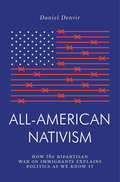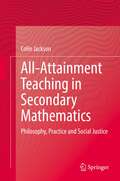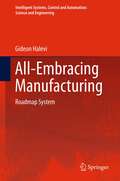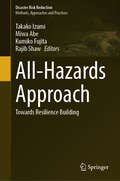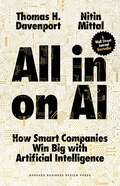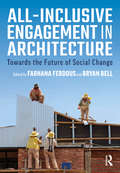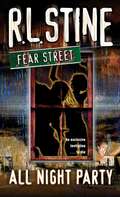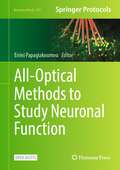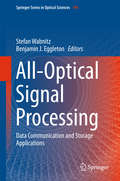- Table View
- List View
All-American Massacre: The Tragic Role of American Culture and Society in Mass Shootings
by Eric Madfis and Adam LankfordWhat elements of contemporary American life contribute to the United States having the greatest number and highest share of public mass shootings around the globe? The editors and contributors to All-American Massacre seek to answer this question by exploring how masculinity, racism, politics, media, fame, education, gun culture, and mental health influence the causes of mass shootings in the United States. With a specific focus on exploring how American culture, institutions, and social structures influence the circumstances, frequency, and severity of mass shootings in the United States, All-American Massacre advances emerging theoretical perspectives and forges fresh approaches, new research questions, and innovative data and conclusions. Bringing together pioneering scholars, this groundbreaking compilation of research and analysis identifies the social roots of this insidious threat and prompts new reflections on how we can stop the seemingly endless cycle of horror and death.All-American Massacre helps clarify the unique nature and salience of mass shootings in American life. Contributors: Melanie Brazzell, Tristan Bridges, Ryan Broll, F. Chris Curran, Sarah E. Daly, Salvatore D’Angelo, James Densley, Tom Diaz, Scott Duxbury, Benjamin W. Fisher, Betsy Friauf, Emma E. Fridel, Celene Fuller, Daniel Gascón, Patrick J. Gauding, Brooke Miller Gialopsos, Simon Gottschalk, Donald P. Haider-Markel, Stephanie Howells, Cheryl Lero Jonson, Mark R. Joslyn, Jessie Klein, Aaron Kupchik, Alison J. Marganski, Melissa M. Moon, Kristen J. Neville, Jaimee Nix, Daniel Okamura, Patrick F. Parnaby, Jillian Peterson, Michael Phillips, Paul Reeping, Jason R. Silva, William A. Stadler, Lindsay Steenberg, Tara Leigh Tober, Jillian J. Turanovic, Abigail Vegter, Stanislav Vysotsky, Lacey N. Wallace and the editors
All-American Murder: The Rise and Fall of Aaron Hernandez, the Superstar Whose Life Ended on Murderers' Row (James Patterson True Crime #1)
by James Patterson Alex Abramovich Mike Harvkey<P>Football coaches, players, and fans called Aaron Hernandez unstoppable. His four-year-old daughter called him Daddy. The law called him inmate #174594. He was a college All-American who became the youngest player in the NFL and later a Super Bowl veteran. He was a star tight end on the league-dominant New England Patriots, who extended his contract for a record $40 million. <P>Aaron Hernandez's every move as a professional athlete played out in the headlines, yet he led a secret life-one that ended in a maximum security prison. What drove him to go so wrong, so fast? Son of a University of Connecticut football hero known as "the King" and brother to a Huskies quarterback, Hernandez was the best athlete Connecticut's Bristol Central High had ever produced. <P>He chose to play football at the University of Florida, but by the time he arrived in Gainesville, he was already courting trouble. Between the summers of 2012 and 2013, not long after Hernandez made his first Pro Bowl, he was linked to a series of violent incidents culminating in the death of Odin Lloyd, a semi-pro football player who dated the sister of Hernandez's fiancée, Shayanna Jenkins. <P>All-American Murder is the first book to investigate-from the unique vantage point of the world's most popular thriller writer-Aaron Hernandez's first-degree murder conviction and the mystery of his own untimely and shocking death. Drawing on original and in-depth reporting, this is an explosive true story of a life cut short in the dark shadow of fame. <P><b>A New York Times Bestseller</b>
All-American Muslim Girl
by Nadine Jolie CourtneyA Kirkus Best Book of 2019A 2021 YALSA Best Fiction for Young Adults BookNadine Jolie Courtney's All-American Muslim Girl is a relevant, relatable story of being caught between two worlds, and the struggles and hard-won joys of finding your place.Allie Abraham has it all going for her—she’s a straight-A student, with good friends and a close-knit family, and she’s dating popular, sweet Wells Henderson. One problem: Wells’s father is Jack Henderson, America’s most famous conservative shock jock, and Allie hasn’t told Wells that her family is Muslim. It’s not like Allie’s religion is a secret. It’s just that her parents don’t practice, and raised her to keep it to herself. But as Allie witnesses Islamophobia in her small town and across the nation, she decides to embrace her faith—study, practice it, and even face misunderstanding for it. Who is Allie, if she sheds the façade of the “perfect” all-American girl?
All-American Nativism: How the Bipartisan War on Immigrants Explains Politics as We Know It (Jacobin)
by Daniel DenvirA major recasting of American history from the vantage of immigration politics It is often said that with the election of Donald Trump nativism was raised from the dead. After all, here was a president who organized his campaign around a rhetoric of unvarnished racism and xenophobia. Among his first acts on taking office was to issue an executive order blocking Muslim immigrants from entering the United States. But although his actions may often seem unprecedented, they are not as unusual as many people believe. This story doesn&’t begin with Trump. For decades, Republicans and Democrats alike have employed xenophobic ideas and policies, declaring time and again that &“illegal immigration&” is a threat to the nation&’s security, wellbeing, and future. The profound forces of all-American nativism have, in fact, been pushing politics so far to the right over the last forty years that, for many people, Trump began to look reasonable. As Daniel Denvir argues, issues as diverse as austerity economics, free trade, mass incarceration, the drug war, the contours of the post 9/11 security state, and, yes, Donald Trump and the Alt-Right movement are united by the ideology of nativism, which binds together assorted anxieties and concerns into a ruthless political project. All-American Nativism provides a powerful and impressively researched account of the long but often forgotten history that gave us Donald Trump.
All-Attainment Teaching in Secondary Mathematics: Philosophy, Practice and Social Justice
by Colin JacksonThis book is about the promotion of all-attainment teaching in the mathematics classroom. The book contains the individual stories of six teachers working in three different schools: an inner London comprehensive with a largely working class intake, a comprehensive on the south coast and a rural comprehensive in Cambridgeshire. Each story describes and explains in brief the background of the teacher and how each came to teach all-attainment groups in mathematics. The research reported in this book is the only close examination and analysis of the practices and methodologies of successful all-attainment educators in the modern age. Three major themes are identified and examined: what sustains the teachers; how they introduce, develop and maintain all-attainment teaching; and how they make all-attainment work in the classroom.From an analysis of these findings, the book presents two interrelated models of the knowledge and understandings the research has generated. The first one is an overarching model of situation and horizon. Used as a means of visualizing and understanding the current situation for teachers, it can aid in encouraging change for the better. The second model offers teachers a way to think of all-attainment teaching as an enabler for all students, most especially for disadvantaged students. Both models have original and explanatory power and offer new ways of conceptualizing how mathematics teaching for social justice might be understood and implemented, offering fresh perspectives and unique insights. As such it will be of help to students at undergraduate, Masters and doctoral level and to education researchers more widely.
All-Bright Court: A Novel
by Connie PorterA New York Times Notable Book: A novel spanning two decades in the lives of an African American family as their upstate New York steel town slowly decays. Set just outside Buffalo, New York, during the 1960s and &’70s, All-Bright Court paints a portrait of the Taylor family—starting with hopeful dreams as Samuel Taylor and his wife, Mary Kate, migrate from the South looking for better opportunities and a place to raise a family, and continuing through the decline of the steel industry as they, their five children, and their neighbors on All-Bright Court struggle with both new challenges and old prejudices. &“In a clear, quiet but powerful prose reminiscent of Sherwood Anderson&’s Winesburg, Ohio, the author draws the gaudily painted, rundown bungalows of All-Bright Court and peoples it convincingly. . . . The working conditions in the steel mills and the politics of the union hall are well rendered, but it is in the details of family life that the novel comes alive.&” —Kirkus Reviews &“Porter has mapped a rich fictional world. . . . This is a powerful and affecting debut.&” —Michiko Kakutani, The New York Times &“An honest portrayal of folks who learned that the dream of economic freedom wasn&’t waiting for them &‘up north.&’&” —Terry McMillan, New York Times–bestselling author of I Almost Forgot About You
All-Day Breakfast
by Adam Lewis SchroederWhen widowed father and substitute teacher Peter Giller leads an eleventh-grade class on a field trip to a plastics factory, he thinks the worst that could happen is that the parent volunteers won't show up (they don't), the kids will be rude (they are) or the free lunch will be terrible (it is).A leaking pipe sprays Peter and the students with a mysterious pink goo and "the worst that could happen" spikes from inconvenient to catastrophic. At first, the goo's strange side effects are mild: short-temperedness, sawdust-scented B.O. and an unquenchable craving for bacon. Then things get spooky: Peter's fingers start falling off, his students forget how to read, no one has to pee-ever-and empathy for human suffering plummets, especially if anyone gets between them and their bacon.Peter can't figure out what's happening-surely he's not a zombie? At no time in any movie does a zombie drive a car and count on his reattached fingers the ways in which he is not a zombie, and anyway, he craves bacon, not brains. But normal people don't put their bodies back together with staple guns and thumb tacks, or contemplate biting off ears. Peter's definitely not fit to be around his children, and his mother-in-law "temporarily" adopts them.Peter's children are all he has left, and he'll do anything to be with them again. He races across the country in a stolen ambulance to face down pinstriped bureaucrats, affectionate farm-girls and monsters plucked from mythology in his search for the cure-if it exists-to his horrifying condition. All-Day Breakfast will satisfy all appetites for the visceral, the violent and hilarious.
All-Embracing Manufacturing: Roadmap System (Intelligent Systems, Control and Automation: Science and Engineering #59)
by Gideon HaleviAll-embracing manufacturing is a system that aims to dissolve the complexity of the manufacturing process and restore the inherent simplicity. It claims that production is very simple and flexible by nature. However, the complexity is a result of the production system approach which makes it rigid and therefore complex. All-embracing manufacturing introduces flexibility to production planning, it eliminates constraints, bottlenecks, and disruptions automatically while it restores the simplicity. No decision is made ahead of time, but only at the time of execution. It introduces technology as dominant part of manufacturing. It is a computer oriented system that imitates human behavior i.e. practically as any of us behave in daily personal life.
All-Girls Education from Ward Seminary to Harpeth Hall, 1865–2015: 1865-2015
by Mary Ellen PethelThe history behind one of the oldest all-girls prep schools in the South. During the final days of the Civil War, Dr. William Ward and his wife, Eliza Ward, envisioned a school for young women in Nashville that would evolve into one of the nation&’s most prestigious institutions. As the New South dawned, Ward Seminary opened its doors in September 1865. Merging with Belmont College for Young Women in 1913, Ward-Belmont operated as a college preparatory school, music conservatory, and junior college. In 1951, the high school division moved farther west, reopening as the Harpeth Hall School after Ward-Belmont&’s sudden closure. Ward Seminary, Belmont College, Ward-Belmont, and Harpeth Hall are simply separate chapters of one continuous story—providing a lens through which to understand the evolution of all-girls education in the United States.
All-Hazards Approach: Towards Resilience Building (Disaster Risk Reduction)
by Rajib Shaw Takako Izumi Miwa Abe Kumiko FujitaThis book presents case studies of risk management of various hazards and risk management systems at regional, national, and local levels. It also proposes a comprehensive approach to reduce future risks by collaborating with various stakeholders and preparing for the most effective responses toward complicated hazards, minimizing social damage.The COVID-19 pandemic has increased the concern as well as interest in the diversification of future risks and the complexity of the damage and impact that multiple risks may cause. These hazard risks include not only natural hazards, but also biological, industrial, and nuclear hazards along with other risks such as cyber-attacks, climate change, food security, conflict, and multiple hazards occurring simultaneously.The Sendai Framework for Disaster Risk Reduction, adopted in 2015 at the United Nations World Conference on Disaster Risk Reduction, accounts for the risks caused by natural or manmade hazards as well as related environmental, technological, and biological hazards and risks. The framework guides the multi-hazard management of disaster risk in development at all levels and sectors. However, in the current disaster management system in most countries, different offices are responsible for each different hazard, making it extremely difficult to manage those hazard risks comprehensively.Having experienced the COVID-19 pandemic, it is now time to review the current risk management strategy and system, and thereafter discuss how to strengthen and transform our risk perception and manner of risk assessment and identification to tackle future multiple hazards. Simultaneously, further collaboration among experts from different backgrounds and fields will become indispensable. While the discussion of the need for an “all-hazards approach” has taken place for many years, there now needs to be discussion of a risk-focused framework.
All-In on AI: How Smart Companies Win Big with Artificial Intelligence
by Thomas H. Davenport and Nitin MittalThough most organizations are placing modest bets on artificial intelligence, there is a world-class group of companies that are going all-in on the technology and radically transforming their products, processes, strategies, customer relationships, and cultures. <P><P>Though these organizations represent less than 1 percent of large companies, they are all high performers in their industries. They have better business models, make better decisions, have better relationships with their customers, offer better products and services, and command higher prices. <P><P>Written by bestselling author Tom Davenport and Deloitte's Nitin Mittal, All-In on AI looks at artificial intelligence at its cutting edge from the viewpoint of established companies like Anthem, Ping An, Airbus, and Capital One. <P><P>Filled with insights, strategies, and best practices, All-In on AI also provides leaders and their teams with the information they need to help their own companies take AI to the next level. <P><P>If you're curious about the next phase in the implementation of artificial intelligence within companies, or if you're looking to adopt this powerful technology in a more robust way yourself, All-In on AI will give you a rare inside look at what the leading adopters are doing, while providing you with the tools to put AI at the core of everything you do.
All-Inclusive Engagement in Architecture: Towards the Future of Social Change
by Farhana Ferdous and Bryan BellShould all-inclusive engagement be the major task of architecture? All-Inclusive Engagement in Architecture: Towards the Future of Social Change presents the case that the answer is yes. Through original contributions and case studies, this volume shows that socially engaged architecture is both a theoretical construct and a professional practice navigating the global politics of poverty, charity, health, technology, neoliberal urbanism, and the discipline's exclusionary basis. The scholarly ideas and design projects of 58 thought leaders demonstrate the architect's role as a revolutionary social agent. Exemplary works are included from the United States, Mexico, Canada, Africa, Asia, and Europe. This book offers a comprehensive overview and in-depth analysis of all-inclusive engagement in public interest design for instructors, students, and professionals alike, showing how this approach to architecture can bring forth a radical reformation of the profession and its relationship to society.
All-Mars All-Stars (Slapshots Series #2)
by Gordon KormanWhen the results are posted for the league's all-star team, the Marsers are dumbfounded over the exclusion of team captain Alexia Colwin. "Chipmunk" Adelman secretly sends out a flyer protesting that Alexia didn't make the team because she's a girl. <p><p>Word is out all over town, and the Marsers are furious. When the big weekend arrives, everyone heads to Windsor to watch. But the all-stars get foodpoisoning and the Mars team must replace them in the finals. Are the Marsers up for the challenge?
All-Night Party (Fear Street #Bk. 44)
by R.L. StineFrom Goosebumps author R.L. Stine comes another eerie Fear Street tale of an all-night party that goes horribly wrong.It's Cindy's birthday, and her friends are throwing her a surprise party on Fire Island. It's a private party—no parents, no cops...in fact, no one around for miles. Except there's a madman loose on the island. A murderer who quietly crashes the party. And he wants to dance with the birthday girl...
All-Night Party: The Women of Bohemian Greenwich Village and Harlem, 1913-1930
by Andrea BarnetThey were smart. Sassy. Daring. Exotic. Eclectic. Sexy. And influential. One could call them the first divas--and they ran absolutely wild. They were poets, actresses, singers, artists, journalists, publishers, baronesses, and benefactresses. They were thinkers and they were drinkers. They eschewed the social conventions expected of them--to be wives and mothers--and decided to live on their own terms. In the process, they became the voices of a new, fierce feminine spirit.There's Mina Loy, a modernist poet and much-photographed beauty who traveled in pivotal international art circles; blues divas Bessie Smith and Ethel Waters; Edna St. Vincent Millay, the lyric poet who, with her earthy charm and passion, embodied the '20s ideal of sexual daring; the avant-garde publishers Margaret Anderson and Jane Heap; and the wealthy hostesses of the salons, A'Lelia Walker and Mabel Dodge. Among the supporting cast are Emma Goldman, Isadora Duncan, Ma Rainey, Margaret Sanger, and Gertrude Stein.Andrea Barnet's fascinating accounts of the emotional and artistic lives of these women--together with rare black-and-white photographs, taken by photographers such as Berenice Abbott and Man Ray--capture the women in all their glory. This is a history of the early feminists who didn't set out to be feminists, a celebration of the rebellious women who paved the way for future generations.
All-Night Pharmacy: A Novel
by Ruth Madievsky*A NATIONAL BESTSELLER*Winner of the California Book AwardWinner of the National Jewish Book Award for Debut FictionFinalist for the Lambda Literary AwardsRachel Kushner meets David Lynch in this fever dream of an LA novel about a young woman who commits a drunken act of violence just before her sister vanishes without a traceOn the night of her high school graduation, a young woman follows her older sister Debbie to Salvation, a Los Angeles bar patronized by energy healers, aspiring actors, and all-around misfits. After the two share a bag of unidentified pills, the evening turns into a haze of sensual and risky interactions—nothing unusual for two sisters bound in an incredibly toxic relationship. Our unnamed narrator has always been under the spell of the alluring and rebellious Debbie and, despite her own hesitations, she has always said yes to nights like these. That is, until Debbie disappears.Falling deeper into the life she cultivated with her sister, our narrator gets a job as an emergency room secretary where she steals pills to sell on the side. Cue Sasha, a Jewish refugee from the former Soviet Union who arrives at the hospital claiming to be a psychic tasked with acting as the narrator&’s spiritual guide. The nature of this relationship evolves and blurs, a kaleidoscope of friendship, sex, mysticism, and ambiguous power dynamics.With prose pulsing like a neon sign, Ruth Madievsky&’s All-Night Pharmacy is an intoxicating portrait of a young woman consumed with unease over how a person should be. As she attempts sobriety and sexual embodiment, she must decide whether to search for her estranged sister, or allow her to remain a relic of the past.
All-Nighter
by Cecilia Vinesse"An absolute, triumphant delight from the first word until the last. Told in a playful, witty voice with crackling banter and tension that could power a city, you will fall in love—with this book, with these characters, with everything."—Jeff Zentner, William C. Morris Award-winning author of In the Wild Light"A fizzy, funny, heartfelt romp that treads the delicious line between hatred and attraction, high school and college, late nights and bleary mornings. This is the sapphic Superbad I never knew I needed!"—Kelly Quindlen, author of She Drives Me CrazyBooksmart meets Today, Tonight, Tomorrow in this page-turning romp about two archnemeses—the valedictorian and the class slacker—who band together for a whirlwind night after discovering that they need each other to achieve their very different sunrise goals. Autumn Povitsky is a high-achieving, booked and busy, straight-A nightmare. She’s currently having a crisis of self—she needs a fake ID ASAP—but because she’s a total square, she has no idea where to get one.Enter buzzcut hottie Tara Esposito. She’s a rule breaker and party crasher of the highest degree, and if anyone knows where to get a fake, it’s her. But Tara has hung up her James Dean leather jacket for the night. If she doesn’t finish this godforsaken essay that’s already weeks late, she can kiss her upcoming graduation goodbye.One brainy girl who needs a fake ID before sundown. One serial rebel who needs to turn in an essay before sunrise. It’s obvious what needs to happen here. But with a years-long feud keeping the girls from working together, this may be a night to forget…or one they’ll remember forever.With razor-sharp dialogue and fiery tension perfect for fans of Becky Albertalli and Casey McQuiston, All-Nighter is a caffeine-fueled labyrinth of chaotic escapades—from prom after-parties to library séances to underground roller discos—led by two enemies who must decide if working together is better than their worlds falling apart.
All-Occasion Appetizers
by Miriam B. LooMiriam B. Loo shares her knowledge of cooking to help you create appetizers for any occasion.
All-Optical Methods to Study Neuronal Function (Neuromethods #191)
by Eirini PapagiakoumouThis open access volume provides an overview of the latest methods used to study neuronal function with all-optical experimental approaches, where light is used for both stimulation and monitoring of neuronal activity. The chapters in this book cover topics over a broad range, from fundamental background information in both physiology and optics in the context of all-optical neurophysiology experiments, to the design principles and hardware implementation of optical methods used for photoactivation and imaging. In the Neuromethods series style, chapters include the kind of detail and key advice from the specialists needed to get successful results in your laboratory. Comprehensive and cutting-edge, All-Optical Methods to Study Neuronal Function is a valuable resource for researchers in various disciplines such as physics, engineering, and neuroscience. This book will serve as a guide to establish useful references for groups starting out in this field, and provide insight on the optical systems, actuators, and sensors. This is an open access book.
All-Optical Signal Processing: Data Communication and Storage Applications (Springer Series in Optical Sciences #194)
by Stefan Wabnitz Benjamin J. EggletonThis book provides a comprehensive review of the state-of-the art of optical signal processing technologies and devices. It presents breakthrough solutions for enabling a pervasive use of optics in data communication and signal storage applications. It presents presents optical signal processing as solution to overcome the capacity crunch in communication networks. The book content ranges from the development of innovative materials and devices, such as graphene and slow light structures, to the use of nonlinear optics for secure quantum information processing and overcoming the classical Shannon limit on channel capacity and microwave signal processing. Although it holds the promise for a substantial speed improvement, today's communication infrastructure optics remains largely confined to the signal transport layer, as it lags behind electronics as far as signal processing is concerned. This situation will change in the near future as the tremendous growth of data traffic requires energy efficient and fully transparent all-optical networks. The book is written by leaders in the field.
All-Organic Baby Food Cookbook: First Time Parent's Guide to Nutritious Foods for Every Age and Stage
by Leah BodenbachThe complete nutrition guide and organic cookbook for healthy and delicious first foods for baby!For new parents, it can be overwhelming to figure out what's best for your baby, especially when it comes to starting solids. Holistic health coach and registered nurse, Leah Bodenbach, helps you navigate the choices (and pressures!) in feeding first foods. In her book, All-Organic Baby Food Cookbook, she offers a step-by-step guide to building your baby's nutritional foundation--including understanding your baby's gut health and nutrient needs for a healthy brain, body, and bones--so that you can tackle the first year of solids with confidence!More than just a cookbook, this book has new parents covered with: • Organic food 101: How to shop organic on a budget, decipher the labels, and other low-toxin living tips • Food allergies and intolerances: Foods to avoid during the first year as well as advice on introducing new foods and common allergens • 125 nutrient-dense recipes: Easy and tasty recipes that follow your baby's growth, from bone broth and single-ingredient purees to toddler snacks and family meals everyone can enjoy • Hybrid feeding approach: Includes baby-led weaning recipes to develop baby's motor skills, regulate their appetite, and encourage self-feeding • Ages and stages: Nutritional and developmental guidance that follows your baby's growing needs, including which foods to introduce and when • First-time parent advice: Tips and tricks as well as common mistakes to avoid in achieving feeding success With All-Organic Baby Food Cookbook, you'll help your baby develop an adventurous palate as well as a healthy relationship with food.
All-Season Edie
by Annabel LyonEleven-year-old Edie Jasmine Snow has one "perfect" thirteen-year-old sister, two loving parents, a cat named Dusty, a grandmother she suspects is a witch, and a grandfather who insists on calling her Albert. Framed by family summer vacations at the lake, All-Season Edie follows Edie through a tumultuous year in which her beloved grandfather becomes ill. In the face of family tragedy, Edie tries to practice witchcraft, learns to dance the flamenco, meets the Greek god Zeus doing his Christmas shopping at the mall, ruins the most important party of her sister's life and realizes that her family is both completely strange and absolutely normal.
All-Star Fever: A Peach Street Mudders Story (Peach Street Mudders Story)
by Matthew F ChristopherBus Mercer, shortstop for the Peach Steet Mudders, wants desperately to be picked for the county all-star team, but he breaks his parents' rules for riding his new bike, and feelings of guilt affect his game.
All-Star Pride (Orca Sports)
by Sigmund BrouwerIt's the All-Star team, made up of the WHL's young hockey players, just one short step away from the NHL. Their goal is to beat the Russian All-Stars in a best-of-seven series to be shown as a television special. Hog Burnell, one of the biggest and toughest players in the league, is happy to be part of it. He could use the money that would come with a series win by the WHL All-Stars. At the very worst, it's a free vacation to Russia. It doesn't take Hog long to discover there's plenty more money to be made along the way...if he's willing to pay the price for it.
All-Star Quilts: 10 Strip-Pieced Lone Star Sparklers
by Helen Frost Blanche Young&“Packed with color examples, patterns, and easy step-by-step directions . . . a fine pick for any quilter seeking an easier way of producing star quilts.&” ―Midwest Book Review Based on the eight-pointed LeMoyne star, these quilt projects use the tried-and-true strip-piecing method that Blanche Young originally developed in 1979. Blanche and her daughter Helen have been exploring this historical star ever since, playing with different configurations and sizes, to captivate generations of quilters to come. The ten projects include Lone Star, Touching Stars, Rolling Star, Broken Star, Star of Bethlehem, Double Star, and Blazing Star—all of which you can make without having to cut diamonds—and a gallery of twenty-five additional quilts is also provided!



